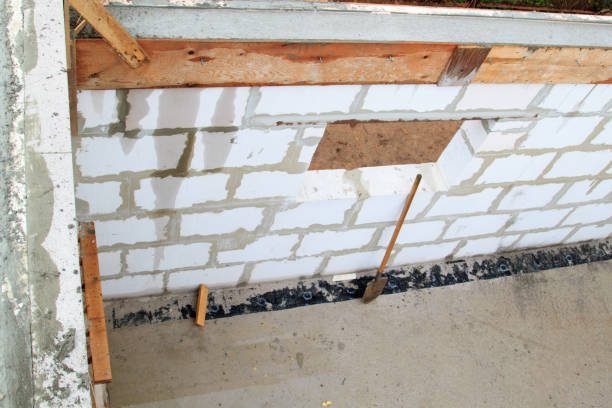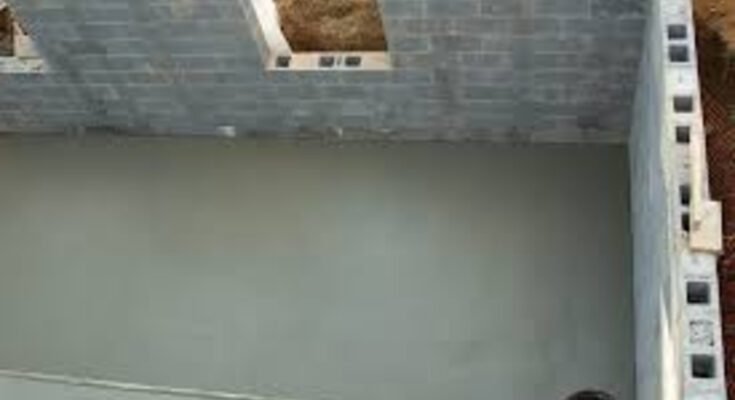1. Introduction
The construction of a home heavily relies on its foundation, with the basement slab at its core. The slab thickness is crucial for protecting the lives of those living in the home. Caring for this crucial aspect is essential to avoid future heartaches when constructing a new house or remodeling an existing one.
In this article, I shall put you through the details of the thickness of the basement slab and get to understand what it entails, how to estimate and get the correct thickness of the slab required, and what measures that will have to be taken to ensure that your foundation is prepared and built in the best manner possible. Now, let us move to this most important and yet misconstrued part of home building that has such a profound impact on your home whatsoever.
2. What is the Basement Slab Thickness?
Basement slab thickness pertains to the thickness of the concrete layer that becomes the basal layer for any basement. It might be given in inches or centimeters and is a very significant factor in making sure that the structure at the foundation level of the home can effectively cope with the pressure from the ground below and other loads above. It is not just a matter of having a floor on which to step; it is a matter of having a substructure that is the foundation of the entire house.
3. Why Basement Slab Thickness Matters
Structural Integrity
This is because your basement slab thickness has a direct impact on the structure of your home. If it is too thin, it will break when pressured, causing floors to wobble, shifting walls, and an unsuitable slab for housing your house. Such problems can constantly escalate and become financially expensive, either for repair services or for making a house uninhabitable.
Moisture Protection
In general, a thicker slab is somewhat more capable of shielding moisture. Plumbing moisture is among the numerous challenges that most basements are exposed to, and it is among the devastating incidences that cause mold, mildew, and structural compromise. Thus, ensuring your basement slab is thick enough prevents water penetration in a moist and unhealthy basement.
Insulation and Energy Efficiency
A properly thickened slab also facilitates better insulation, so your home has the temperature you desire. This can help lower your electricity consumption since your lighting will not be very much relied upon to light up your room during the day.
It is one of those aspects that, at a glance, may not seem very influential, but the truth is that it is quite crucial when it comes to energy conservation in a home.
4. Standard Basement Slab Thickness

Residential Standards
In most residential construction, the basement slab’s standard thickness is about 4 to 6 inches. Such a thickness is commonly adequate to bear the load a typical home or building applies and shields against moisture and soil movement.
Commercial Standards
In commercial-type construction, the requirement for the slab thickness may be higher, occupying a zone between 6 and 8 inches. This is so because commercial buildings occupy larger space in terms of area than residential buildings due to their size. In many cases, the weight on the commercial building floors is higher than that on the residential building floors, hence the need for a more substantial base to support the extra load.
Variations Based on Soil Type
Another important factor in determining the thickness of the basement slab is the type of soil in the area. A thicker slab is necessary if the ground beneath the building is likely to shift or is otherwise poor or expansive. Engineers usually conduct ground surveys to establish the most appropriate thickness of the required slab.
5. Factors Influencing Basement Slab Thickness
Load-Bearing Requirements
The amount of load that your basement slab can handle is one of the great considerations that will determine its thickness. Livier loads, such as those in commercial or multi-story residential buildings, call for a thicker slab finish to avoid problems like cracking.
Soil Composition and Stability
The kind of soil on which your home is built also contributes to this in a big way. Areas with sandy or loose soils probably require the slab to be thicker to support the weight, while clay soils require less thickness.
Local Building Codes and Regulations
Every state has its laws, and it’s crucial to consider those of your region when deciding the thickness of the basement slab. Some of these codes are meant to ensure that homes being constructed are safe and resistant to the environmental conditions prevailing in that region.
6. Determining the Right Thickness for Your Basement Slab
Consulting with Engineers
One of the best ways to ensure your basement slab is the right thickness is to consult a structural engineer. They can assess your needs based on your home’s design, the local soil conditions, and other factors.
Analyzing Environmental Conditions
To sum up, getting a structural engineer is one of the most effective means of arriving at the right thickness of your basement slab. They can evaluate your circumstances concerning your house’s construction, the region’s soil, and other features.
Balancing Cost with Quality

On the other hand, one may get tempted to decide on a thicker slab to save costs, which is counterproductive in the long run. It is important not to forget that these long-term costs can lead to more repairs and, perhaps, damage, not speaking about the initial savings. One must, therefore, use the appropriate thickness for one’s work from the onset to avoid having to do it later.
7. Common Mistakes in Basement Slab Installation
Underestimating Thickness Requirements
The most common mistake is choosing the top layer’s wrong thickness. This sometimes results in structural faults, such as cracks, and complete foundation failure.
Ignoring Soil Testing
Another such mistake is when producers or farmers fail to conduct soil testing. It is very difficult to decide on the appropriate thickness of the slab if the planner and the builder do not clearly understand the nature of the soil that will eventually support the structure.
Cutting Corners on Materials
It is unwise for manufacturers to use inferior materials to produce their products to reduce the costs incurred in providing raw materials.
Material and workmanship: The thickness of the slab depends on the type of concrete used and vice versa. The slab is compromised if low-quality materials are used, causing a shorter lifespan.
8. Case Studies: Lessons from Real-Life Projects
The Consequences of Skimping on Slab Thickness
For instance, one homeowner managing their expenses cut the thickness of the basement slab to a minimum of what was advised. Soon, as is always the case with such projects, the problems started to emerge, and the foundation got shaken.
This only goes to show that the adage, ‘the cheapest is the costliest,’ holds when the repair expenses prove more costly than the original amount of money that would have been spent to have the appliances fixed properly in the first place.
How Proper Slab Thickness Saved a Home from Disaster
On the other hand, another project involved a home constructed on a ground that was likely to experience ground shifting. A more robust slab protected the homeowner from possible foundation damage in the event the soil moved, thus retaining the home’s value.
9. Future Trends in Basement Slab Construction

Eco-Friendly Materials and Methods
However, due to environmental changes, the construction industry is shifting to sustainable construction materials. This involves integrating environmentally friendly materials into basement slabs, such as recycled concrete materials that are environmentally friendly but equally serve the intended purpose of creating the best basement slabs.
Innovations in Slab Design for Better Durability
Technical developments also affect slab design in the same way they influence other construction components’ designs. New gantries and materials are emerging that help construct slabs that are thicker but also stronger and well-equipped to withstand various environmental tendencies.
10. Practical Tips for Homeowners
Ensuring Quality in Your Basement Slab
To guarantee a great basement slab, you must hire a contractor specializing in foundation work. Request samples and contact information for earlier clients to get an idea about the company’s work standards.
Questions to Ask Your Contractor
It is also important to lay down the details of your project to your contractor and do not shy away from asking them about their previous work done on basement slabs, the materials used in the work, and how they arrive at the most suitable thickness for a slab. These questions will help you understand their level and be in a position to make the right decision for your home.
11. Conclusion
Recap of Key Points
The basement slab’s thickness is another essential element that determines the steadiness of the home and its durability. With the right thickness, it is possible to achieve maximum effect from internal support to waterproofing and insulation.
Final Thoughts
Sinking your hard-earned cash into a good quality basement slab thickness should not be just the code requirement; it is all about providing safe and comfortable habitation for you and your family for many years. Do not necessarily looking for shortcuts—get in touch with professionals, think about one’s circumstances, and focus on getting the quintessence rather than the price. It is a fact that your home’s very foundations depend on these kinds of systems.
FAQs
[saswp_tiny_multiple_faq headline-0=”h3″ question-0=”Why is thickness of the basement slab considered to be so vital?” answer-0=”Basement slab thickness is the hidden champion of the house base. To some people it is just a small specification – but it is what makes your home stand firm, protected and, most importantly, sheltered. An efficient slab thickness can act as a shield against cracks, moisture, as well as the work of the shifting soil on the house. When it comes to the safety of the close ones and the durability of the house, the thickness of the basement slab is one of the most important factors, which cannot be ignored.” image-0=”” headline-1=”h3″ question-1=”What are the consequences of having a thin slab for the structure of the building?” answer-1=”When it comes to a thin slab, it’s a risk one can hardly afford. You know how you get a house and it standing more or less straight on the ground, and then over time, the weight of the house begins to weaken the ground it rests on, and suddenly, you get cracks, uneven flooring and walls that are starting to bow? These problems are not mere nuisances they become structurally following issues may lead to very costly structural work up to the degree that the safety of the whole house can be at risk.” image-1=”” headline-2=”h3″ question-2=”What is the proper thickness of the slab flooring I need for my home and how do I arrive at this?” answer-2=”Selecting the correct thickness of slabs is never a question of guesswork – it requires professional guidance. It is important to deal with a structural engineer who is familiar with the soil type in your region and requirements of the house. Asking for the advice of experts on such issues will at one time allow you avoid future regrets and, on the other hand, build your home with as strong a base as should be required.” image-2=”” headline-3=”h3″ question-3=” What signal should I look out for to tell me that my basement slab might be too thin?” answer-3=”However, there are some signs of the ‘stamp of a thin slab’ that you must be aware of – that your slab is way too thin. If you begin to see cracks on your basement floor, or if the floor has become ridged, or doors and windows that do not fit perfectly, it is high time you consider having your slab checked. All these problems if not arrested early may lead to worse phenomena later in the future.” image-3=”” headline-4=”h3″ question-4=”What role played by soil in slab thickness?” answer-4=”A baseline of the type of soil is important when determining the thickness of the slab on which the basement will be constructed. Some reasons that could warrant a thick slab include where the ground is characteristically unstab; or expansive. Pre-construction soil testing is necessary – understanding what is beneath your home enables the lay a good base to be built on.” image-4=”” headline-5=”h3″ question-5=”The key question that arises to understanding why some contractors compromise the slab thickness is to ask the following question.” answer-5=”However, it is wrong to have contracted out since some contractors may decide to compromise the quality of the construction to save cost or complete the project faster. However, this pursuance of a short-term advantage has disastrous effects on the long-term welfare of your home. It is always advisable to employ the services of a construction contractor who values the quality of construction services and who complies with the set construction codes. It is-crucial that a home’s foundation does not allow provision of shortcuts.” image-5=”” headline-6=”h3″ question-6=”What legitimate measures can I take to guarantee compliance with the right slab thickness by my contractor?” answer-6=”To be on the safe side in the determination of the right slab thickness to be used, it is relevant to ask the right questions to your contractor and perform research. Ask them to provide more information of how they decide on the thickness of slabs, the materials used and if they undertake soil analysis. It is also advisable to engage a structural engineer who will analyze and confirm that all the laid down plans regarding the structure meet the set requirements.” image-6=”” headline-7=”h3″ question-7=”What are the trends in the future for basement slab thikness construction?” answer-7=”However innovative is the construction technology of today, there are great positives that are emerging in terms of further improved slabs for basements. Sustainability, through the use of reclaimed aggregate, recycled concrete, and the advanced slab conception. Neither of these progress are solely about constructing better houses; they are about constructing better houses more sustainably. ” image-7=”” count=”8″ html=”true”]




